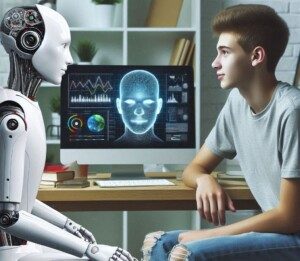With the increasing prevalence of AI platforms, will AI ever take over human assessments for autism?
A research team had surprising results.
A study from Karolinska Institutet, published in JAMA Network Open, presents a new machine learning model that can predict autism in young children using limited information.
This model, named AutMedAI, has demonstrated an accuracy rate of nearly 80% for kids under two years old, potentially aiding early detection of autism.
How the Study Was Done
The research team utilized a large database from the US (SPARK), which includes data on around 30,000 people — with and without autism.
By examining 28 different factors that can be easily gathered before a child turns two, the team developed four machine learning models to find patterns in the data.
The most effective model, AutMedAI, was able to identify approximately 80% of kids with autism from a group of about 12,000.
Important indicators included the age of the child’s first smile, the timing of their first short sentence, and any difficulties with eating.
The paper explains that this study shows it’s possible to identify kids who may be autistic using limited and readily available information.
The AI model proved particularly effective in identifying children who faced significant challenges with social communication.
The research team plans to refine and validate the model further in clinical settings.
They are also considering incorporating genetic data to enhance the accuracy and specificity of predictions.
The researchers point out, however, that this AI tool is not meant to replace an autism clinical assessment.
It’s meant to be an adjunct to an ASD assessment. But certainly, many people are probably wondering if AI will ever actually replace human psychologists and neuropsychologists who conduct autism evaluations.
Artificial intelligence one day replacing standard autism assessments?
My autism assessment took about four hours for the first part, then 45 minutes for the second part.
And this was all after an intake form that took me three hours to fill out.
It’s not believable that AI could ever replace a human being interacting with and observing someone for several hours.
It also seems that it would be much more difficult to create an AI system that can diagnose autism in adults.
Some autistic people are diagnosed later in life due to subtle or masked symptoms.
Many individuals develop strategies to mask or compensate for their challenges, which can make their difficulties less noticeable to others and potentially delay a diagnosis.
Additionally, autism manifests differently in each person. There’s no such thing as a “typical Autistic.”
Some individuals may not exhibit obvious signs or may not fit common diagnostic criteria or stereotypes, leading to missed or late diagnoses.
This variability in presentation can make it harder for healthcare professionals, teachers or parents to suspect autism early on.
Instead, such an individual, when young, is simply thought of as any of the following: weird, creative, artistic, brainy, antisocial, nerdy, strange, odd, uptight, rude, disrespectful, too quiet, too loud, too analytical, socially awkward, etc.
If there’s insufficient understanding of how autism presents, especially in adults or those with less noticeable symptoms, it can result in delayed diagnosis.
Misdiagnosis is another factor. Traits of autism can sometimes be mistaken for other conditions, leading to incorrect diagnoses.
Humans, then, aren’t exactly a stellar source of detecting autism early on.
Artificial intelligence platforms are programmed by humans.
Therefore, the logical deduction is that AI will never be reliable at identifying autism in every single autistic child or adult.
Some autistic babies may begin smiling very early in life, start speaking sentences early and never be picky about their food.
The 80% accuracy rate of the AI in the study may sound promising, but there are two things to consider:
First, 80%, when it comes to diagnostics, is still a very low number. Or look at it this way: This means the autism in 20% got missed.
Secondly, this study focused on kids under two, who are far less complex than adults and way too young to understand the concept of mimicking neurotypical behavior and masking autistic traits to “fit in.”
Autism Doesn’t Mean Impaired Intellect
Autism is primarily a socio-communication disorder and is not inherently linked to intellectual impairment.
While some Autistics may have intellectual disabilities, autism itself does not cause this type of cognitive impairment.
Similarly, a low IQ does not cause autism.
Autism Spectrum Disorder is characterized by difficulties in social interaction and communication, and it exists independently of cognitive ability levels.
Autism and intellectual functioning are separate aspects and should never be equated.
Have I said that enough? I hope so!
 Lorra Garrick has been covering medical and fitness topics for many years, having written thousands of articles for print magazines and websites, including as a ghostwriter. She’s also a former ACE-certified personal trainer. In 2022 she received a diagnosis of Level 1 Autism Spectrum Disorder and subsequently has developed an intense interest in ASD.
Lorra Garrick has been covering medical and fitness topics for many years, having written thousands of articles for print magazines and websites, including as a ghostwriter. She’s also a former ACE-certified personal trainer. In 2022 she received a diagnosis of Level 1 Autism Spectrum Disorder and subsequently has developed an intense interest in ASD.
.










































